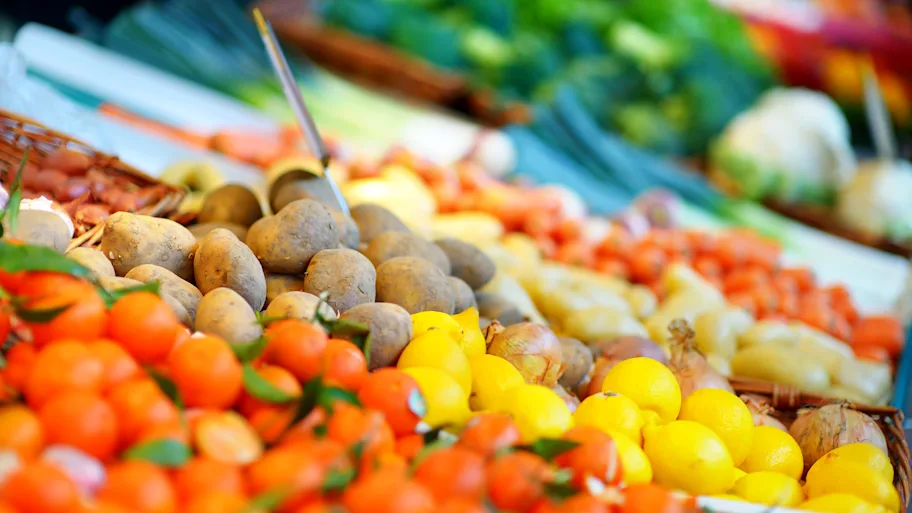
- Science news
- Featured news
- How food upcycling and vertical gardening could help fight food insecurity: five articles you won’t want to miss this World Food Day
How food upcycling and vertical gardening could help fight food insecurity: five articles you won’t want to miss this World Food Day

On October 16th, international organizations commemorate the founding of the UN Food and Agriculture Organization. On its 80th anniversary, World Food Day is calling for global collaboration in creating a peaceful, sustainable, prosperous, and food-secure future.
Below, we’re highlighting hot-off-the-press research aiming to prevent food waste and foster food security.
You might unknowingly be upcycling food, helping to prevent food waste
Turning overripe bananas into banana bread or using vegetable scraps to make stocks is something many people routinely do in their kitchens. This is known as food upcycling, a process during which products that would otherwise be wasted are processed to make them suitable for consumption.
Recently, researchers in Germany surveyed participants to learn more about the acceptance of food upcycling of fruits and vegetables. They published their findings in Frontiers in Sustainable Food Systems.
They found that while people think food waste should be avoided, food upcycling isn’t yet commonly practiced. Just about half of the participants were familiar with the term, but more might be upcycling food without being aware of it. The biggest barriers were time constraints, insufficient knowledge, and a lack of ideas. Only 20% of respondents thought food upcycling was easy to implement, underscoring the need for more accessible guidance and resources. Older people were found more likely to implement food upcycling in daily life. Further research should identify or develop targeted initiatives for different age groups to improve awareness and participation, the team wrote.
Article link: https://www.frontiersin.org/journals/sustainable-food-systems/articles/10.3389/fsufs.2025.1662557/full
Quinoa and buckwheat could secure food supply when staple crops can’t withstand climate change
Climate change is threatening people, animals, and plants alike. It also makes growing enough food for a rising world population more difficult. Projected to reach 10 billion by 2050, a growing population requires more food, but how can this be achieved when already now 90% of farmland is affected by climate-related stress?
In a newly published Frontiers in Plant Science study, researchers in the UAE reviewed how pseudocereals – plants that produce fruits or seeds that are consumed like grains but are neither true cereals nor non-cereal staple crops – could help with food security, improve health, and be used industrially.
They found that pseudocereals like quinoa, buckwheat, and amaranth – which are rich in fiber and antioxidants and able to survive draughts, saline soils, and extreme temperatures – have strong nutritional profiles that make them important for achieving food security. Yet, their potential remains untapped. But depending on staple crops is not enough to combat climate change and global population increase, the authors wrote, and future work should focus on region-specific breeding strategies of pseudocereals, consumer acceptance, and sustainable growing practices to ensure large-scale adoption.
Article link: https://www.frontiersin.org/journals/plant-science/articles/10.3389/fpls.2025.1662267/full
Vertical gardens could drastically improve food security, income, and gender empowerment in informal settlements
Over 55% of the world’s population now lives in cities, a number that is rapidly growing. This urban expansion places strain on food systems, especially in the Global South and in informal settlements where infrastructure, governance, and economic opportunities are inadequate.
Researchers in Kenya recently published a Frontiers in Sustainable Food Systems article in which they investigated how vertical gardening contributes to food security and gender dynamics in Nairobi’s informal settlements, where about 85% of residents are food insecure. Vertical gardening means stacking containers or other repurposed sacks or items on top of each other to grow food.
The study showed that vertical gardening contributed positively to food availability, accessibility, utilization, and stability. It was found to reduce dependency on fluctuating markets, and improved access during times of draught or political unrest. In addition, vertical gardening was identified as a way to empower women who often play a pivotal role in maintaining gardens. Sometimes, households could even supplement their income by selling surplus produce, highlighting the practice’s potential to improve household nutrition, advancing gender equality, and enhancing urban resilience.
Article link: https://www.frontiersin.org/journals/sustainable-food-systems/articles/10.3389/fsufs.2025.1654777/full
Food as medicine program could improve food insecurity if implemented on large scale
Mothers-to-be who experience food insecurity are more likely to develop gestational diabetes, which increases the risk of pregnancy complications and lasting impacts on mother and child. In the US, there are programs aiming to prevent this, but identifying, enrolling, and screening patients is time- and resource-intensive.
Writing in Frontiers in Health Services, researchers in the US ran a pilot study which provided food to insecure mothers-to-be with ‘grocery prescriptions’ to test the feasibility of a food-as-medicine program. For 12 weeks, 14 women who were between 20 and 28 weeks pregnant received $200 per month to purchase healthy, medically tailored grocery items. Over time, healthier purchasing habits emerged.
The study identified important bottlenecks in screening and referral systems. Food insecurity, for example, was not routinely screened for at the medical center where participants were recruited. Furthermore, clinic staff had limited time for enrollment, and some of the women who had been initially identified as potential participants fell outside of the gestation age window before enrollment could be completed. In the future, such programs should extend the gestation age to 32 weeks, to also enable women who just gave birth to still profit from the program, the researchers wrote. Future studies should also examine the health effects on patients, which could not be produced here due to the small number of participants.
Article link: https://www.frontiersin.org/journals/health-services/articles/10.3389/frhs.2025.1625558/full
Better marketing of organic food could encourage consumers to buy
Organic foods are healthier for people and the environment but make up only a small fraction of the total food and beverage market. Now, writing in a new Frontiers in Sustainable Food Systems article, an international team of team of researchers evaluated the availability, price, and vendor and marketing characteristics of organic foods in Brazil, India, and the UK. More than 800 food vendors participated.
Among them, 37% sold at least one of 14 monitored commonly consumed organic foods, suggesting limited availability. The team found regional differences in the way organic foods and beverages were marketed to consumers: in Brazil and the UK, the most frequently used term for sustainable products was ‘organic’, in India, however, the term ‘natural’ was most common. Just 8% of organic products were sold at a discount, making price reductions an uncommon marketing strategy. Organic foods were marketed using different themes, including health benefits, a theme that was most frequently employed in India; and environmental benefits, mostly highlighted in the UK. These results highlight the need for evidence-based and context-specific marketing strategies in the organic food market, the authors wrote.
Article link: https://www.frontiersin.org/journals/sustainable-food-systems/articles/10.3389/fsufs.2025.1670638/full
REPUBLISHING GUIDELINES: Open access and sharing research is part of Frontiers’ mission. Unless otherwise noted, you can republish articles posted in the Frontiers news site — as long as you include a link back to the original research. Selling the articles is not allowed.







